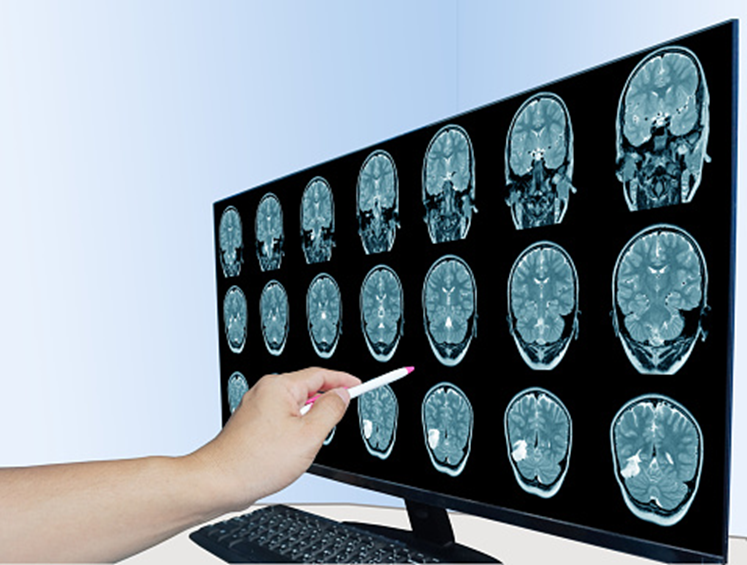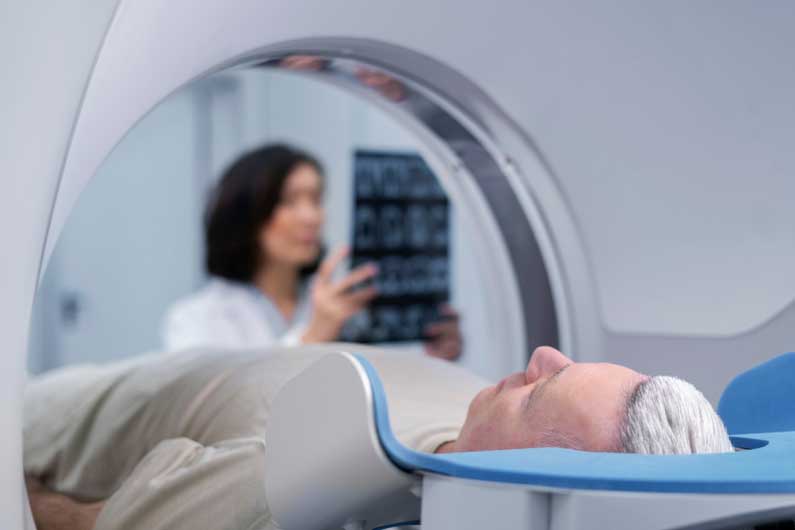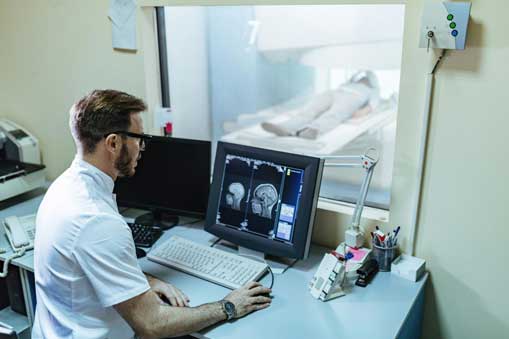Concussions are a type of traumatic brain injury that can occur after a bump, fall, or hit to the head. Concussions can also happen when an object strikes your body, and your head snaps back and forth. Symptoms of a concussion vary from person to person and can develop immediately or days after the injury occurs.
This guide will discuss the various post concussion symptoms after sustaining a concussion. We will also look at etiology, how to diagnose, and when to seek medical attention.
It is important to remember that every individual experiences concussion differently and will therefore recover at their own pace. There is no one-size-fits-all approach to recovery – what works for one person may not work for another.
What causes post concussion syndrome?
Several factors can contribute to the onset of post concussion syndrome. The following is a list of some of the most common causes:
Trauma to the brain
Trauma to the brain is one of the main causes of post-concussion syndrome.
When a hit to the head or other severe blow causes damage to the brain, it can lead to a range of cognitive impairments and neurological symptoms that last long after the initial injury.
This condition is typically characterized by memory, attention, behavior, emotion, sleep, and concentration issues.
Factors like gender and general health status can also play a role in who is at greater risk for developing post-concussion syndrome. Therefore, anyone who has a serious trauma afflicted the head should be aware of this condition’s possible signs and symptoms and seek appropriate medical treatment as soon as possible. It is possible to reduce or even prevent the long-term effects of concussions on the overall quality of life.
Inflammation of Brain Tissue
Inflammation of brain tissue is one of the causes of post concussion syndrome. This can be caused by a direct blow to the head or by the head being violently shaken.
When the brain is inflamed, it swells and puts pressure on the skull. This can lead to various symptoms, including headaches, dizziness, nausea, and difficulty concentrating.
Inflammation of brain tissue can cause memory problems, sleep disorders, and mood swings in severe cases.
If you have suffered a blow to the head, it is important to seek medical help immediately. Inflammation of brain tissue can worsen over time, so prompt treatment is essential.
Sports-Related Injuries
Sports-related injuries are a leading cause of post concussion syndrome. The most common type of injury is a blow to the head, which can cause the brain to collide with the inside of the skull.
This can lead to bruising, bleeding, and damage to the delicate tissue of the brain. In some cases, this damage can be severe enough to cause long-term problems, such as chronic headaches and difficulty concentrating.
A medical professional should evaluate anyone who sustains a head injury as soon as possible to determine if they are at risk for post concussion syndrome. Early diagnosis and treatment are essential for preventing long-term complications.
Mild Traumatic Brain Injury
Another common cause of post concussion syndrome is a mild traumatic brain injury. This type of head injury occurs when a person experiences a blow to the head that doesn’t result in loss of consciousness or other obvious symptoms.
Unfortunately, these injuries can be hard to detect and may not present any noticeable symptoms immediately following the accident.
Mild traumatic brain injuries can cause long-term problems, including memory loss, difficulty concentrating, and mood swings.
If you have suffered a head injury that doesn’t seem to be healing as quickly as expected, it is important to seek medical help. This can help ensure that you get the treatment you need to prevent more serious complications.
As you can see, several factors can contribute to the onset of post-concussion syndrome. Whether you have suffered a head injury due to trauma, inflammation, or sports-related activities, you must seek prompt medical attention to reduce your risk of developing long-term complications. With proper diagnosis and treatment, it is possible to minimize the effects of concussions and return to your normal quality of life.
How is Post Concussion Syndrome Diagnosed?
To diagnose Post concussion syndrome, health professionals get a medical history, neurological examination, and neuropsychological testing.
The first step is to take a thorough medical history, including any past concussions or head injuries. This will allow your doctor to understand your risk factors better.

The doctor will then perform a physical examination, looking for any signs of neurological damage. By doing so, they can rule out other possible causes of your symptoms.
Finally, the patient will undergo neuropsychological testing to assess thinking, memory, and mood. This testing can help identify any changes that may have occurred due to the concussion.
Post concussion syndrome is a complex condition, and diagnosis can be challenging. However, with a comprehensive evaluation, most patients can receive an accurate diagnosis and begin treatment.
Post Concussion Symptoms
Now that you know what causes post concussion syndrome let’s look at some of the most common symptoms.
As we mentioned before, symptoms can vary depending on the individual. They may also change or worsen over time. They may also be either cognitive symptoms or physical symptoms
The most common post concussion symptoms include:
Headaches
Headaches are one of the most common post-concussion symptoms.
The injury can cause them to the head, the swelling of the brain, or the pressure exerted on the brain when there is bleeding.
They can also be caused by the medications that are given for concussions.
Most headaches after a concussion will go away within two weeks, but some people may have headaches lasting for months or even years.
There are many ways to treat headaches, including over-the-counter and prescription medications, acupuncture, massage, and relaxation techniques. If you have a severe headache that lasts for more than two weeks, you should see a doctor ensure no other underlying condition.
Dizziness
Dizziness is one of the most common post concussion symptoms and can make it difficult to perform everyday activities like walking or driving.
You can do several things to address this issue, such as taking frequent breaks throughout the day, avoiding caffeine or other stimulants, and engaging in light physical exercise.
Additionally, engaging in cognitive therapy can help you retrain your brain around issues that may be causing your dizziness. With proper care and rest, you should be able to recover from your concussion fully and regain control of your body once again.
Fatigue
Fatigue is one of the most common symptoms of a concussion. It can be caused by the brain injury itself or the medications used to treat the concussion.
Fatigue can make it difficult to concentrate, remember things, and make decisions. It can also cause headaches, dizziness, and lightheadedness. Fatigue can make it difficult to return to work or school. It can also interfere with your ability to drive, operate machinery, or participate in sports.
If you are experiencing fatigue, it is important to rest and avoid strenuous activity. You should also avoid alcohol and caffeine, which can worsen fatigue. If fatigue persists for more than a few days, you should consult a doctor.
Irritability
Irritability is a common symptom of post concussion syndrome that can be defined as feeling easily annoyed or provoked.
It can be caused by many things, such as changes in hormones, medications, stress, or sleep-deprived. Irritability can also be a sign of depression.
Irritability is a common symptom of post concussion syndrome and can last for weeks or months after the injury.
One can manage it with cognitive-behavioral therapy, relaxation techniques, and stress management treatments. If you are experiencing this symptom, it is important to talk to your doctor to rule out other causes and find the best treatment.

Anxiety
Another Post Concussion symptom is Anxiety, often experienced as a sense of dread or foreboding. This can be accompanied by feelings of irritability, Panic attacks, and acute stress.
In severe cases, it may result in OCD or post-traumatic stress disorder. Anxiety can also manifest as physical problems such as headaches, chest pain, racing heart, increased sweating, and difficulty breathing. The anxiety is so severe that it significantly impacts their quality of life and ability to function normally for some people.
Insomnia
Insomnia is also one symptom that occurs following a concussion.
While the exact cause is unknown, it is believed that Insomnia following a concussion is caused by a combination of physical and psychological factors. The physical factors include changes in the brain that occur due to the injury, which can disrupt the body’s natural sleep-wake cycle. The psychological factors include stress and anxiety, which are often experienced after a traumatic event.
Insomnia can significantly impact the quality of life, and it is important to seek treatment if Insomnia is impacting your ability to function. Treatment options for Insomnia include medication, therapy, and lifestyle changes. If you are struggling with Insomnia, please talk to your doctor about treatment options.
Loss of concentration and memory
One of the most common post concussion symptoms is a loss of concentration and memory. It can be difficult to remember simple tasks or focus on a single task for an extended period. Many people also report feeling “foggy” or “slowed down.”
These symptoms can make it difficult to return to work or school and impact your ability to perform everyday activities. If you are experiencing these symptoms, it is important to seek medical help. A qualified healthcare provider can help you manage your symptoms and ensure that you are on the road to recovery.
Ringing in the ears
After experiencing a head injury or concussion, many people report experiencing various symptoms, including ringing in the ears.
This symptom is typically attributed to the impact on the brain’s temporal lobe and auditory cortex, and it can be quite jarring for those who experience it.
This symptom will resolve over time as the body recovers from the injury in many cases. However, there are some things that you can do to help manage and alleviate this particular post-concussion symptom, including using noise-canceling headphones or earplugs to limit exposure to loud noises that may exacerbate the ringing sensation.
Additionally, staying well hydrated can also help prevent excess pressure in the ear. Overall, suppose you experience ringing in your ears after a concussion. In that case, it is important to speak with your doctor and find ways to manage these uncomfortable symptoms until they subside naturally.
Blurry vision
This symptom can be due to changes in the brain’s chemical composition and damage to the nerve fibers that send visual information from your eyes to your brain.
Blurred vision can make everyday tasks such as reading, writing, and driving difficult or even impossible. In some cases, blurred vision may even persist long after the initial concussion has healed. If you are experiencing post-concussion symptoms like blurred vision, speak with your doctor about strategies for managing this condition and restoring your physical abilities.
Depending on the severity of your injury and other factors, treatment options may include medication or physical therapy.
Noise and light sensitivity
This symptom can arise due to damage to the brain’s auditory or visual processing centers and often makes it difficult for people with post-concussion syndrome to function normally in their everyday lives.
Noise and light sensitivities may manifest as a heightened awareness of sounds or bright lights or hypersensitivity that causes migraines, nausea, dizziness, or even fainting when exposed to loud noises or bright lights.
The symptoms mentioned above are just a few of the most common post-concussion symptoms that people experience. While these symptoms can be debilitating, it is important to remember that they are usually temporary and will resolve over time with proper medical care.
If you or someone you know is experiencing post-concussion syndrome, please seek medical attention from a qualified healthcare provider. With proper diagnosis and treatment, most people make a full recovery and return to their previous level of functioning.

Risk Factors
The primary risk factors for post-concussion syndrome include age, gender, minor traumatic brain injury, and prior history of head injuries.
Older adults may be more susceptible to concussion due to reduced blood flow and slower healing time in the brain. Similarly, women are more likely than men to experience traumatic brain injuries and risk developing post-concussion syndrome.
Finally, people who have had previous concussions or head injuries are more likely to experience post-concussion syndrome after a subsequent mild head injury.
If you have any of these risk factors, it is important to be extra cautious to avoid head injuries. When participating in activities with head injuries (e.g., biking, skiing, football), Wearing a helmet can help reduce the risk of concussion and post-concussion syndrome.
Additionally, suppose you have experienced a head injury in the past. In that case, it is important to tell your doctor so that they can properly monitor you for symptoms of post-concussion syndrome.
Treatment / Management of Post Concussion Symptoms
There is no one-size-fits-all approach to treating post concussion syndrome. The best course of treatment will vary depending on the individual and the severity of their symptoms.
In most cases, rest is the best medicine for post concussion syndrome. This means taking a break from work or school and avoiding any activities that may aggravate your symptoms.

It is also important to limit your exposure to noise and bright lights, as these can exacerbate symptoms like headaches and migraines.
If you are experiencing difficulty sleeping, speak with your doctor about improving your sleep hygiene or taking medication to help you rest.
In some cases, they may recommend physical therapy to help you regain your strength and stamina. A physical therapist can also teach you exercises that may help to alleviate some of your symptoms.
If your post concussion syndrome is severe or you are not responding to conservative treatment measures, you may need to be seen by a specialist.
A neurologist or neuropsychologist can provide you with further assessment and treatment. In some cases, medication may be necessary to help manage your symptoms.
The Role of Education About Concussions
Education about concussions is important for both medical professionals and the general public.
Medical professionals need to be up-to-date on the latest research to provide the best possible care to their patients.
The general public needs to be aware of the signs and symptoms of a concussion and the importance of seeking medical attention if they or someone they know has sustained a head injury.
There are many resources available to help educate people about concussions. The Centers for Disease Control and Prevention (CDC) provides information about concussions on their website and educational materials that can be downloaded and printed.
The Brain Injury Association of America (BIAA) also has a website with information about concussions and support and resources for people with brain injuries and their families.
How long does post concussion recovery take?
The recovery time for a concussion can vary widely from person to person. It depends on several factors, including the severity of the initial injury, individual differences in brain structure and functioning, and lifestyle factors such as stress levels or physical activity.
However, some general guidelines can help give insight into how long a post-concussion recovery might take.
Typically, it takes around 1-2 weeks for most symptoms to resolve completely, though this may be longer in cases where there were more serious injuries or underlying conditions.
In addition, full recovery can take several months, especially if there are ongoing issues with memory or focus. While each case is unique, it is important to remember that it is possible to greatly reduce the length of post-concussion rehabilitation with proper rest and treatment.
When to see a doctor
If you or someone you know has suffered a head injury, it’s important to seek medical attention. Even if the person does not seem to be injured, concussions can still occur.
There is no way to predict how long it will take to recover from a concussion. However, most people will start to feel better within a few days or weeks.
If you or someone you know is still experiencing symptoms after this period, it’s important to see a doctor. Post-concussion syndrome can last for months or even years.

Can post-concussion syndrome be permanent?
At first glance, the post-concussion syndrome may appear to be a simple matter of treatment and recovery. However, recent research has shown that this condition can lead to more serious long-term complications. Some studies have even suggested that post-concussion syndrome may be a permanent or long-lasting condition. While the exact causes of its chronic nature remain unclear, research suggests that there may be several underlying factors at play.
Some people are more vulnerable than others to developing post-concussion symptoms.
Factors such as genetics, anxiety levels, and overall health status might make a person more likely to experience ongoing symptoms even after the immediate acute phase of the concussion has passed.
In addition, it seems that certain experiences after the injury may exacerbate these symptoms over time. For example, being exposed to repeated traumatic events or stressors following a concussion can trigger inflammation in the brain and lead to ongoing brain activity and function changes. Postconcussion syndrome must be taken seriously and treated by healthcare professionals to mitigate these underlying factors wherever possible. Ultimately, taking an active approach to their care is key to managing and improving their long-term outlook for those dealing with lingering concussion symptoms.
How many concussions could lead to develop post-concussion syndrome?
While the answer to this question remains unknown, some believe that as few as two concussions can lead to post-concussion syndrome.
This condition can cause various symptoms, including headaches, dizziness, and fatigue, lasting for weeks, months, or even years.
Researchers believe that the severity of post-concussion syndrome is related to the number of concussions a person sustains. For example, those who suffer multiple concussions in a short period are more likely to experience more severe symptoms. While a single concussion may not lead to post-concussion syndrome, it is important to be cautious and seek medical attention if you experience any symptoms.
How common is post-concussion syndrome?
While some people will only experience symptoms for a few days or weeks, others may have long-term problems. The most common symptoms include headaches, dizziness, fatigue, anxiety, and difficulty concentrating. People may also experience sleep problems, irritability, and depression.
Post-concussion syndrome is thought to affect around 10% of people who have a concussion. However, the exact number is difficult to determine because many people do not seek medical treatment after sustaining a concussion. As a result, the true prevalence of post-concussion syndrome may be underestimated.
Although there is no cure for post-concussion syndrome, one can often manage symptoms with medication and lifestyle changes.
If you think you may have post-concussion syndrome, it is important to see a doctor get the help you need.

Can post-concussion syndrome be prevented?
There is currently no surefire way to prevent post-concussion syndrome (PCS). However, some things may lower your risk of developing the condition.
For example, it is important to rest physically and mentally if you suffer a concussion. This means taking a break from physical activity and avoiding mentally stimulating activities like working or using electronic devices. It is also important to follow up with your doctor after sustaining a concussion and take any medications prescribed.
In some cases, they may also recommend rehabilitation therapy. While there is no guaranteed way to prevent PCS, these steps may help lower your risk of developing the condition.
Final thoughts on Post Concussion Symptoms
Whether you’re a professional athlete or someone who experienced a concussion in everyday life, it’s important to take your recovery seriously.
With the right treatment and self-care practices, you can restore your brain function, manage your symptoms, and ultimately get back to doing the things you love.
Some helpful strategies include incorporating meditation and mindfulness into your treatment plan, engaging in physical activity regularly, and working closely with your doctor to develop a personalized treatment plan.
At the end of the day, if you stay motivated and focused on recovering from your concussion symptoms, you will almost certainly experience positive results. So don’t give up – there is light at the end of the tunnel!
